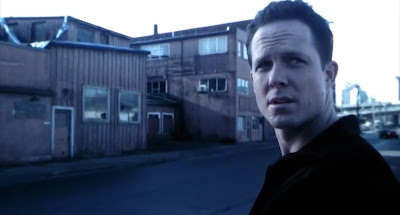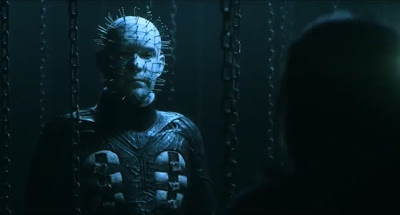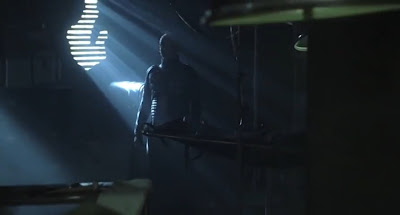 |
| Trevor (Dean Winters) is increasingly unable to tell what's real. |
Release Date: Oct. 15, 2002. Running Time: 89 minutes. Screenplay by: Carl V. Dupré, Tim Day. Directed by: Rick Bota. Produced by: Michael Leahy, Rob Schmidt.
THE PLOT:
Trevor (Dean Winters) survives when his car spins out of control and drives off a bridge and into a river. He remembers trying to save his wife, Kirsty (Ashley Laurence). He remembers her being trapped in the car. But when the police recover the vehicle, there is no body. Kirsty has vanished.
Detective Lange (William S. Taylor) reveals that Kirsty had a sizable inheritance, which now legally belongs to Trevor. It's a compelling motive, and Lange's partner (Michael Rogers) doesn't even pretend to think that Trevor is anything but guilty.
The accident left Trevor with a head injury, and he's having trouble remembering any details. He's suffering from severe headaches and increasingly bizarre hallucinations. He seems demonic figures across the street, in the hall, and even in the police station. Then people he knows begin dying around him, with him not even certain whether the corpses are real or just more illusions...
 |
| Kirsty can't seem to escape from a certain puzzle box... |
CHARACTERS:
Trevor: Like Inferno, this movie presents a deeply flawed protagonist in Dean Winters' Trevor. Unlike the earlier movie, it tries to allow the viewer to sympathize with him by hiding his misdeeds with the time-honored plot device of amnesia. Alas, even when all is revealed, Trevor just isn't terribly interesting. There's not much about him that's in any way distinct. When Pinhead judges both him and his sins to be "mundane," I found myself nodding in agreement.
Kirsty: Hellseeker's main draw is the return of Ashley Laurence as Kirsty. There actually is some potentially interesting material for her. Had she been the focus, it might even have made for a good movie. Too bad, then, that her role amounts to little more than a cameo, with her character turns mostly revealed as backstory. At least Rick Bota was smart enough to insert a scene between her and Pinhead, with her left to once again make a bargain with her would-be torturer. This bit, likely written in a hurry, ends up being one of the film's few memorable moments.
Det. Lange: William S. Taylor channels his inner Columbo as the police detective assigned to Trevor's case. He is nothing but friendly to his suspect, even insisting that he believes Trevor that the car crash was an accident. But, like Columbo, he always has just one more question, just one more thing that needs to be cleared up. Taylor does well with what he's given, and his final exchange with Trevor is rather good.
 |
| Seems like old times: Pinhead bargains with Kirsty. |
PINHEAD:
"I will not rest until I get what I want. And what I want is you!"
-Pinhead reunites with Kirsty.
The most interesting element of Pinhead's role is how little interest he shows in Trevor. He freely discloses that the film's main character is mere "bait" to attract his real prey: Kirsty. He regards Trevor with clinical detachment, discussing him like a scientist evaluating an experiment (in Trevor's case, probably more of a control subject). With Kirsty, he's emphatic, even emotional. When he says he wants her, he almost sounds like a suitor - and when she bargains, he responds with amusement, seemingly indulging the bargain more to keep their game going than out of any real desire for what she's offering.
All of which makes it a shame that this would be Kirsty's last appearance, as it's clear that there's some potential fun to be had mining this bizarre relationship.
 |
| Trevor's car sinks into the water. Remember: If you don't have All State, you could be paying for this yourself. |
THOUGHTS:
Actors' future roles can affect a viewing of their past works. The opening of Hellseeker is a strong case of this. The first scene shows Dean Winters - who went on to become All State's "Mayhem" - getting distracted while driving, then going off a bridge and into the water. In 2002, this was just a would-be "grabber." Now it plays so much like one of Winters' "Mayhem" commercials that, as the car sank, I couldn't help but intone: "And if you don't have All State, you could be paying for this yourself."
Director Rick Bota has acknowledged that Hellseeker began life as a spec script, with the Hellraiser elements grafted onto it. Which raises the question: Given how little story exists with the Hellraiser trappings, exactly how little was there before? There might be enough story to fill out a 30-minute Twilight Zone, but there's certainly not enough for a feature film.
I suspect that, if anything, this script was improved by the Hellraiser elements. The handful of good moments are ones that embrace the Hellraiser mythos: Trevor being given the box by a mystery man who vaguely resembles the homeless man from the first film; his conversation with Pinhead, the demon not actually present but instead reflected in a pool of water; a walk down a hallway that recalls the lowest level of The Channard Institute, ending in a confrontation with a being not unlike the demonic twins of Bloodline; and, of course, Pinhead's bargain with Kirsty. These bits work. Most of the rest... doesn't.
A big problem is the lack of any real structure. For most of its running time, Hellseeker doesn't build. It meanders. I don't know that I've ever seen a film with a more passive protagonist than Trevor. Informed that his wife is missing, he... goes home, then to work (where he does Work. At Office.) Even at the end, when the revelations come, it's neither because of nor in spite of him. All Is Revealed because it's the last twenty minutes, rather than because of anything inherent he does. It's not even that Trevor tries to avoid the truth. He just sort of passively waits for it be delivered to him.
There are a handful of positives. Acting ranges from passable to quite good. Director Rick Bota may not have the visual eye of Inferno's Scott Derrickson, let alone Clive Barker, but he picks a handful of moments to stage with care. Particularly noteworthy is Pinhead's grand entrance at the end, which is clearly patterned after the Cenobites' arrival in the attic in the original movie.
Bota was also wise enough to seek out Clive Barker's feedback. This secured him Barker's blessing; and, based on the DVD audio commentary, Barker's advice led to a few scenes being punched up. It's not enough to save the film, but at least it helps it to have a few good moments - even if most of them are reserved for the last twenty minutes.
 |
| Pinhead's grand entrance, visually patterned after the first film. |
OVERALL:
Hellseeker is mostly boring, with seemingly endless scenes of Dean Winters wandering around doing little, with the occasional jump scare thrown in to wake up the audience. It also covers a lot of the same ground as Inferno, which mainly served to remind me how much better Inferno was.
It improves near the end, with a few good visual beats and a strong finale. This keeps it from being a total loss. Even so, this is easily the worst Hellraiser movie so far - a title that, sadly, I suspect it won't retain...
Overall Rating: 3/10.
Previous Movie: Hellraiser - Inferno
Next Movie: Hellraiser - Deader
Review Index
To receive new review updates, follow me:
On Twitter:
On Threads:
No comments:
Post a Comment